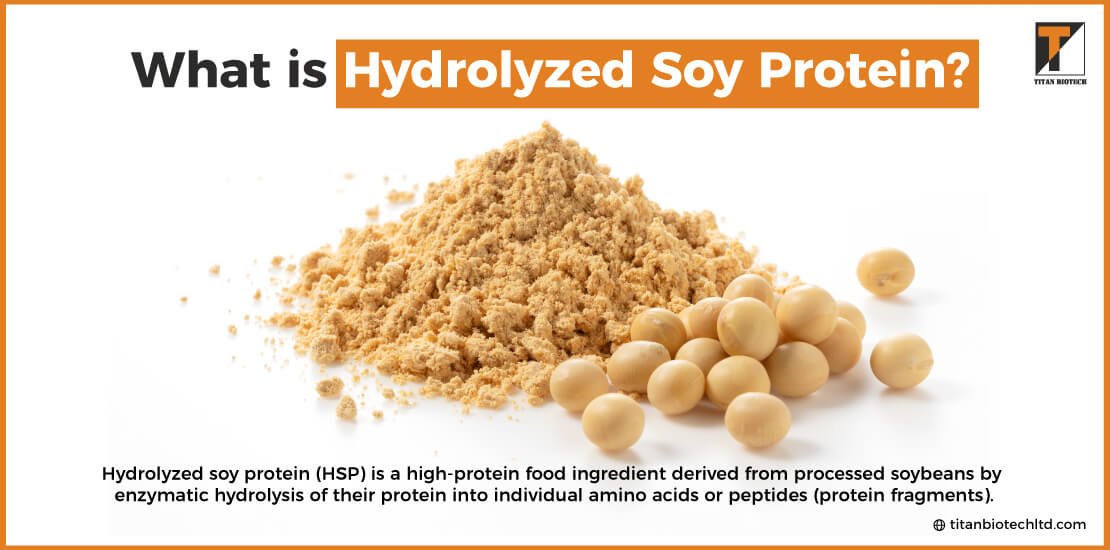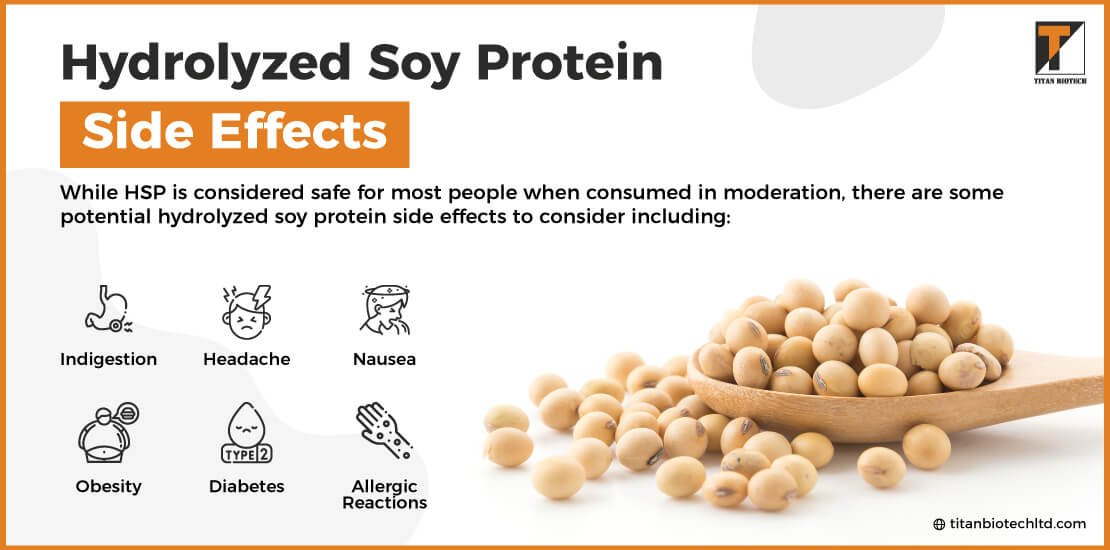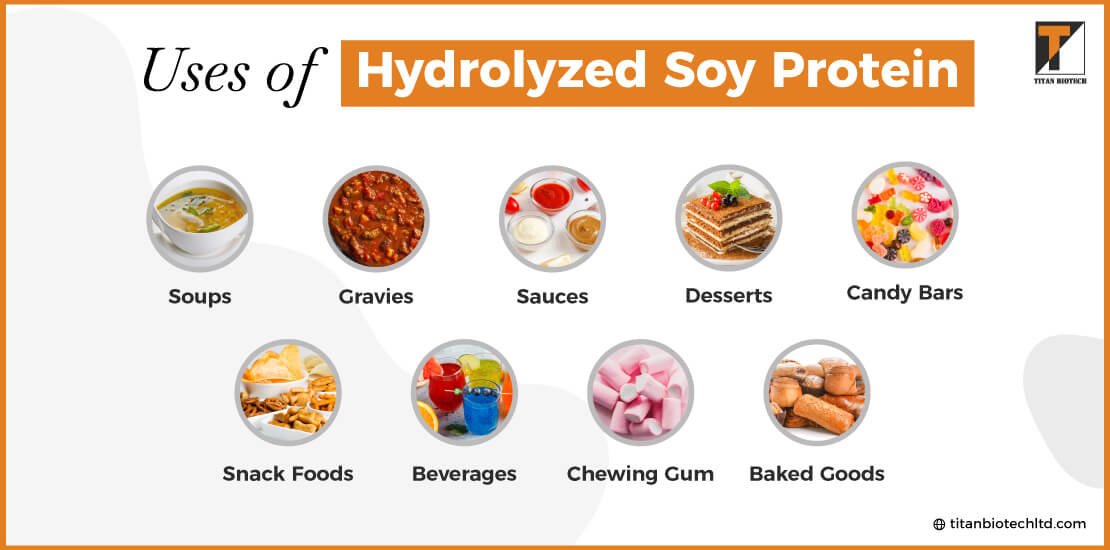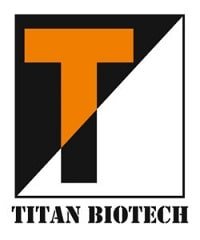Table of Content
- Introduction
- How Does Hydrolyzed Soy Protein Work?
- Hydrolyzed Soy Protein Side Effects
- Uses of Hydrolyzed Soy Protein
- Reduces Symptoms of IBS
- Why Choose Titan Biotech’s Soy Protein for Your Product?
- Frequently Asked Questions (FAQs)
Introduction
Hydrolyzed soy protein (HSP) is a high-protein food ingredient derived from processed soybeans by enzymatic hydrolysis of their protein into individual amino acids or peptides (protein fragments).

There are various health effects of hydrolyzed soy protein. Protein gives various health benefits to the body, including improved digestion and absorption of vitamins and minerals. In addition, It has been shown to alleviate symptoms of irritable bowel syndrome (IBS), such as bloating and diarrhea type 2.
How Does Hydrolyzed Soy Protein Work?
The enzymatic hydrolysis of soybeans produces hydrolyzed soy protein (HSP). The hydrolysis process breaks down proteins into short peptides with amino acids linked together. These peptides are known as HSPs because they are similar to other proteins in animal tissues such as meat and fish. Still, they do not have the same nutritional value as meat and fish proteins because they lack essential amino acids such as lysine and methionine.
The HSPs are often used in foods such as meat analogs and vegetarian burgers because they have the taste characteristics of meat products but are lower in fat than meat products like chicken nuggets or hamburgers.
Hydrolyzed Soy Protein Side Effects

While HSP is considered safe for most people when consumed in moderation, there are some potential hydrolyzed soy protein side effects to consider including:
- MSG: It can cause allergic reactions, indigestion, headache, and nausea, among other problems. It also has been linked to obesity, type 2 diabetes, heart-related disease, and stroke. MSG (monosodium glutamate) is an organic salt of L-glutamate that occurs naturally in many food products such as tomatoes and other vegetables.
- 3-MCPD: This chemical is found in hydrolyzed soy protein products. 3 MCPD has been shown to cause adverse hydrolyzed soy protein health risks when consumed in high doses, such as cancer or reproductive toxicity.
Uses of Hydrolyzed Soy Protein
Hydrolyzed Soy Protein (HSP) is a food additive used in many processed products, including meat products, soups, gravies, sauces, baked goods, desserts, snack foods, candy bars, chewing gum, and beverages. This additive can be found in many products containing soy protein or protein derived from soybeans. The term “hydrolyzed” refers to its chemical reaction with water to release small amounts of amino acids from its original structure. These hydrolyzed proteins are often used because they have a lower cost than whole proteins due to their ease of manufacture during processing.

Hydrolyzed soy protein is also used in many types of food products, like salad dressings, dips, and sauces. It can be found in canned beans, tofu, and many other types of foods.
The FDA has approved hydrolyzed soy protein as a food ingredient. However, no studies are proving that hydrolyzed soy protein has any health benefits over other types of protein powder or meal replacement shakes.
Hydrolyzed soy protein is derived from a process that breaks down soy protein into its amino acids.
The hydrolyzed soy protein in this product is derived from soybean. It has been processed using an enzymatic process that changes the structure of the protein without destroying its nutritional value.
Reduces Symptoms of IBS
Hydrolyzed soy proteins, or HSP, have been proven to alleviate Irritable Bowel Syndrome (IBS) symptoms. Hydrolyzed soy protein contains all nine essential amino acids (the building blocks of proteins), which means it provides complete nutrition for your body. It’s also made from soybeans, which are usually low in fat, sodium, and calories compared to meat and dairy products.
Why Choose Titan Biotech’s Soy Protein for Your Product?
We at Titan Biotech produce Soy protein from non-GMO soybeans, which are offered in various concentrations and formulations to suit multiple product requirements. Adding Titan Biotech’s soy protein to your product could provide several advantages, such as:
- Better nutritional profile: Soy protein is a top-notch protein source that can raise your food’s nutritional value.
- Plant-based and vegan-friendly: Soy protein is a plant-based protein source ideal for consumers who eat a vegan or vegetarian diet. It is also suitable for those who are vegetarians.
- Allergen-friendly: It is safe for people with allergies or intolerances to use soy protein because it is free of several common allergens like dairy, gluten, and nuts.
- Functionality: The emulsification and foaming abilities of soy protein can enhance the mouthfeel and texture of foods.
Titan Biotech is a leading manufacturer of hydrolyzed protein which has been approved by most major health authorities, including the FDA (U.S. Food & Drug Administration), WHO (World Health Organization), USDA (United States Department Of Agriculture), etc.
Frequently Asked Questions (FAQs)
Is hydrolyzed soy protein gluten-free?
Yes, HSP is gluten-free. It can enhance the flavor of foods such as curries, sauces, meat and fish, and vegetables. It increases the shelf life of shelf-stable products and can be used on soy-based meat substitutes for increased textural benefits.
Is hydrolyzed soy protein an allergen?
Yes, excess levels of HSP can be a leading cause of a bloated stomach and lots of water retention. Other than that, some common symptoms are headaches, nausea, tightness in the face, and a speeding heart rate.
Is hydrolyzed soy protein good for cats?
Yes, HSP is highly beneficial for cats with food sensitivities. Hydrolyzed soy protein, made up of low molecular weight peptides, is easily digestible and beneficial to gastrointestinal and dermatological health.
References:
- https://www.sciencedirect.com/science/article/pii/S0022030295766292
- https://link.springer.com/article/10.1007/s11743-998-0026-2
- https://www.sciencedirect.com/science/article/abs/pii/S0308814621009328
- https://pubs.acs.org/doi/pdf/10.1021/jf60208a021

